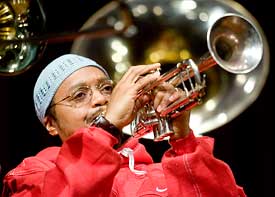When you’re a top-flight New Orleans musician on tour, you get respect.

But not at home—particularly after Hurricane Katrina wrecked parts of the city, said four members of the New Orleans-based Hot 8 Brass Band, in a program Jan. 25 at Hill Auditorium headed by musicology Assistant Professor Mark Clague.
“It’s kind of hard being home, you’re not really wanted,” said tuba player Bennie Pete. He joined three other band mates seated on orange-cushioned, dark wood chairs on the stage, flanked by Clague, who posed questions as students and faculty looked on.
The program was part of the ongoing Rev. Dr. Martin Luther King, Jr. Symposium, with its theme “a time to break silence.”
Band members spoke on a range of issues affecting New Orleans. They said politicians are quick to tout the local music as a draw for tourists. But they said musicians are hassled by performance restrictions and otherwise disrespected. “The police love to harass musicians,” said snare drummer Dinerral Shavers. “Musicians don’t get the respect from the system. Without you, there is no city, no culture.”
Shavers, who still lives in the city, said he’s concerned with talk of replacing homes and row houses with more upscale construction. “That’s the worry, that you’ll destroy the environment the music grew up in,” Shavers said. “How can you build a condo when you can’t even rebuild a house? That’s what I don’t understand.”
“The Hot 8 Brass Band residency helps break a deafening silence left in the wake of Hurricane Katrina—no music,” Clague said. “The members of the Hot 8 are survivors.”
He noted that some of the instruments the group was scheduled to perform with Jan.27 at the Michigan Theater were drenched in the floodwaters.
“Born at the confluence of Latin, Caribbean, African and European peoples, the music of New Orleans thrives on such a diverse human resource,” Clague said. “Today, musicians are scattered. Diaspora is a disaster for New Orleans music.
“Four months after the storm hit, some members of the Hot 8 are back in New Orleans, but others reside in New York and Houston. It’s hard to rehearse with that kind of commute.”
Members of the group that is promoted as New Orleans’ top young brass band ironically say they’re currently unable to make enough to earn a living in New Orleans.
Clague said U-M was helping to hold the band together by giving them a temporary performance place and audience.
“By presenting the energy of the Hot 8, it’s traditional voice and contemporary ‘brass hop’ stylings, U-M hopes both to help revive the sound of New Orleans and to help the Hot 8 find a future,” he said.
It wasn’t long into the program when Clague asked the scaled-down four-member version of Hot 8 to demonstrate their style. Shavers, standing, laid down a military band beat on the snare, and Pete blew a strutting bass figure on the tuba. Trumpet player Raymond Williams and trombonist Keith Anderson took turns soloing, and playing together—one sometimes ascending while the other ran up the scale, and back down again.
“It’s polyphony; a lot of voices at the same time. It sounds like a party,” Clague said after the number ended and applause fell away.
“That’s what it be, that’s what it be,” trombonist Anderson said, nodding.

